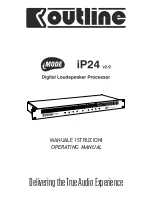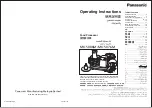
C-4
DSP56009 User’s Manual
MOTOROLA
Application Examples
C.3
TYPICAL AUDIO APPLICATION
Figure C-2
depicts a sample configuration using the DSP56009 for AC3 Surround or
DTS.
Figure C-2
Using the DSP56009 for Surround Sound
Optional memory for soundfield
effects, DTS decoding, buffering, and booting
DSP56009
SAI Tx
SAI Tx
ICE 958 Rx
SAI Rx
Host
Microcontroller
SHI
EEPROM
EMI
SAI Tx
Stereo DAC
Stereo DAC
Stereo DAC
Right
Left
Center
Subwoofer
Surround L
Surround R
AA0444
(not required for AC3 applications)
SRAM
Summary of Contents for DSP56009
Page 19: ...MOTOROLA DSP56009 User s Manual 1 1 SECTION 1 OVERVIEW ...
Page 38: ...1 20 DSP56009 User s Manual MOTOROLA Overview DSP56009 Architectural Overview ...
Page 39: ...MOTOROLA DSP56009 User s Manual 2 1 SECTION 2 SIGNAL DESCRIPTIONS ...
Page 64: ...2 26 DSP56009 User s Manual MOTOROLA Signal Descriptions On Chip Emulation OnCETM Port ...
Page 65: ...SECTION 3 MEMORY OPERATING MODES AND INTERRUPTS ...
Page 85: ...MOTOROLA DSP56009 User s Manual 4 1 SECTION 4 EXTERNAL MEMORY INTERFACE ...
Page 149: ...MOTOROLA DSP56009 User s Manual 5 1 SECTION 5 SERIAL HOST INTERFACE ...
Page 180: ...5 32 DSP56009 User s Manual MOTOROLA Serial Host Interface SHI Programming Considerations ...
Page 181: ...MOTOROLA DSP56009 User s Manual 6 1 SECTION 6 SERIAL AUDIO INTERFACE ...
Page 207: ...MOTOROLA DSP56009 User s Manual 7 1 SECTION 7 GENERAL PURPOSE INPUT OUTPUT ...
Page 212: ...7 6 DSP56009 User s Manual MOTOROLA General Purpose Input Output GPIO Register GPIOR ...
Page 220: ...A 8 DSP56009 User s Manual MOTOROLA Bootstrap ROM Contents ...
Page 221: ...MOTOROLA DSP56009 User s Manual B 1 APPENDIX B PROGRAMMING REFERENCE ...
Page 250: ...B 30 DSP56009 User s Manual MOTOROLA Programming Reference ...
Page 251: ...MOTOROLA DSP56009 User s Manual C 1 APPENDIX C APPLICATION EXAMPLES ...
Page 262: ...C 12 DSP56009 User s Manual MOTOROLA Application Examples ...
Page 269: ...MOTOROLA DSP56009 User s Manual C 1 APPENDIX C APPLICATION EXAMPLES ...
Page 280: ...C 12 DSP56009 User s Manual MOTOROLA Application Examples ...















































